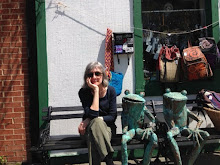[excerpted from my remarks on the occasion of being installed as Rabbi at Temple Kol Tikvah, 12/5/2010]
Pharaoh has two dreams which he cannot understand – seven fat cows eaten by seven skinny cows, seven fat ears of grain eaten by seven skinny ears of grain – and he is very anxious. Joseph (a young Hebrew slave at this point) is fetched from prison to interpret Pharaoh’s dreams. Joseph explains that the dreams are one, that both are prophesying seven years of abundance followed by seven years of famine. Joseph then gives Pharaoh some management advice about how to prepare for the famine, and Pharaoh accepts his advice and puts Joseph in charge of carrying out the plan.
Here is what’s amazing about this story: Pharaoh trusts Joseph. Pharaoh puts his faith in Joseph. Pharaoh hands Joseph the authority to radically restructure Egyptian society. And on what basis? All that Pharaoh knows about Joseph up until this moment is what he heard from his royal butler: that Joseph once successfully interpreted two dreams while he was in prison. Oh yes, and the Torah tells us that Joseph was extremely good looking. But other than that, what does Pharaoh know about Joseph that would give him cause to trust him?
After Joseph presents his dream interpretation and management advice, the Torah tells us: Va-yitav ha-davar b’aynay Faro, u-v’aynay kol avadav. And the thing – or the word – seemed good in the eyes of Pharaoh, and in the eyes of all his servants.
How does trust happen? Apparently, something about what Joseph says – or perhaps the way he says it – leads Pharaoh to trust him. Pharaoh is convinced that Joseph’s words come from a divine source – which still begs the question of what it was about those words that led Pharaoh to that conclusion.
And we might also assume that there was something about Pharaoh himself that led him to trust Joseph and to recognize the divine spirit moving through him. So we could say that trust happens in the interaction between the minds and hearts of both of the people involved.
How does trust happen? Ultimately, it takes a leap of faith, doesn’t it? It takes a leap of faith to choose to trust someone. Think about it: For the first seven years of Joseph’s master plan, as they are stockpiling grain in anticipation of the famine, the Egyptian people have no way of knowing if there is indeed a famine coming.
It takes a leap of faith to do most things in our lives. How about in your life right now? What leap of faith are you taking?
Pharaoh has two dreams which he cannot understand – seven fat cows eaten by seven skinny cows, seven fat ears of grain eaten by seven skinny ears of grain – and he is very anxious. Joseph (a young Hebrew slave at this point) is fetched from prison to interpret Pharaoh’s dreams. Joseph explains that the dreams are one, that both are prophesying seven years of abundance followed by seven years of famine. Joseph then gives Pharaoh some management advice about how to prepare for the famine, and Pharaoh accepts his advice and puts Joseph in charge of carrying out the plan.
Here is what’s amazing about this story: Pharaoh trusts Joseph. Pharaoh puts his faith in Joseph. Pharaoh hands Joseph the authority to radically restructure Egyptian society. And on what basis? All that Pharaoh knows about Joseph up until this moment is what he heard from his royal butler: that Joseph once successfully interpreted two dreams while he was in prison. Oh yes, and the Torah tells us that Joseph was extremely good looking. But other than that, what does Pharaoh know about Joseph that would give him cause to trust him?
After Joseph presents his dream interpretation and management advice, the Torah tells us: Va-yitav ha-davar b’aynay Faro, u-v’aynay kol avadav. And the thing – or the word – seemed good in the eyes of Pharaoh, and in the eyes of all his servants.
How does trust happen? Apparently, something about what Joseph says – or perhaps the way he says it – leads Pharaoh to trust him. Pharaoh is convinced that Joseph’s words come from a divine source – which still begs the question of what it was about those words that led Pharaoh to that conclusion.
And we might also assume that there was something about Pharaoh himself that led him to trust Joseph and to recognize the divine spirit moving through him. So we could say that trust happens in the interaction between the minds and hearts of both of the people involved.
How does trust happen? Ultimately, it takes a leap of faith, doesn’t it? It takes a leap of faith to choose to trust someone. Think about it: For the first seven years of Joseph’s master plan, as they are stockpiling grain in anticipation of the famine, the Egyptian people have no way of knowing if there is indeed a famine coming.
It takes a leap of faith to do most things in our lives. How about in your life right now? What leap of faith are you taking?
